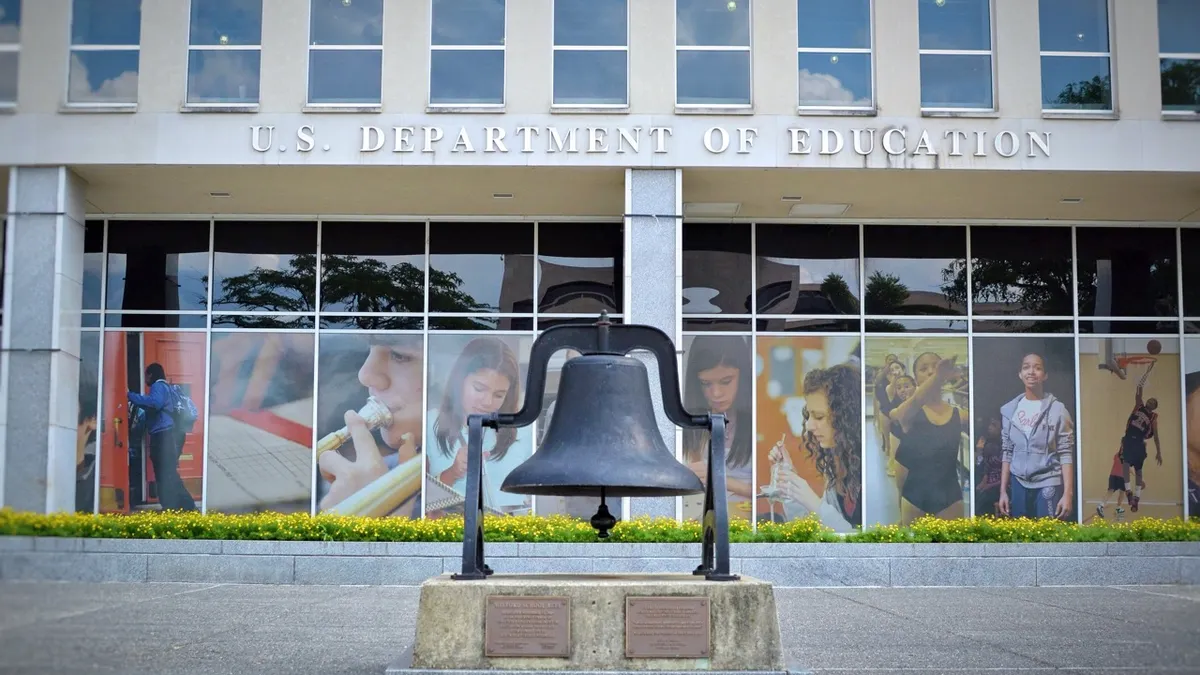Dive Brief:
- The U.S. Department of Education's Office for Civil Rights updated its decision on a string of sex discrimination complaints brought against six Connecticut school districts and the Connecticut Interscholastic Athletic Conference, saying it serves as "a formal statement of OCR’s interpretation of Title IX."
- In May, OCR said the Connecticut districts and athletic conference discriminated against biological female student-athletes under Title IX by allowing transgender student-athletes to compete alongside them. Its decision barred transgender students in Connecticut from sports teams that align with their gender identity and expression. OCR at the time said its interpretation of Title IX was only to be applied to these complaints.
- The Aug. 31 update makes the interpretation official, and Title IX legal experts say OCR is setting a ruling that can be used to decide future trans student-athlete cases. It's possible, they add, that the decision could also impact trans student inclusion in other areas, like bathroom and locker room access.
Dive Insight:
"OCR is using a rather obscure letter to set official policy on its position on trans student protections under Title IX," said Brett Sokolow, president of the Association of Title IX Administrators.
OCR's update Monday comes just 10 weeks after the U.S. Supreme Court's landmark decision in the Bostock v. Clayton County, Georgia case LGBTQ discrimination is unlawful sex discrimination in the workplace. However, in that case, the justices declined to address transgender policy in schools.
OCR's update "seems both a protest and a capitulation to Bostock," said Sokolow.
A separate OCR investigation opened Monday references the Supreme Court Bostock decision, but says it "does not control the Department’s interpretation of Title IX." Read together, legal experts say the letters in the two investigations clearly signal the Department’s position that Title IX does not require granting trans students equal access to locker rooms, bathrooms, sports teams, or other sex-segregated areas of their choosing.
This is a departure from the norm, lawyers said, considering the office usually says its decisions don't reflect policy and refrains from publishing information on recently opened investigations.
Elizabeth Meyer, a Title IX expert and associate professor at the University of Colorado Boulder School of Education, said most legal scholars would interpret Bostock as applying to all civil rights law, including Title IX, and would advise districts to craft more trans-inclusive practices based on that decision. But the department's attempt to "torque it" creates "an incredibly gray area" for school districts, Meyer added. She said now the lower courts will be left to decide which decision — the Supreme Court's Bostock or the Department of Education's — prevails.
Inevitably, Meyer said, it will be Bostock.
In the meantime, the OCR's updated decision could impact multiple cases working their way through the courts that bring into question districts' policies regarding transgender student inclusion in facilities and athletic programs, the legal experts said.
Last week, the Fourth Circuit Court of Appeals ruled in a high-profile case in favor of a transgender man, Gavin Grimm, who as a student sued the Gloucester County (Virginia) School Board in 2015. The case reached the Supreme Court in 2017, but was sent back to a lower court for review when the Trump administration rescinded the Department of Education's Title IX protections for trans students.
The Grimm case, along with others that have questioned Title IX's impact on trans student protections, makes an eventual Supreme Court decision possible, legal experts contend. "What we don't have is an interpretation of Bostock for TItle IX, and this could be it," Sokolow said.
For the time being, school districts could lean on the Education Department's updated guidance to craft trans exclusive practices, Meyer said. While not a Dear Colleague letter, an avenue through which the department sets guidance, the decision has a similar precedent-setting effect, she added.
The stance is "a very strong message to schools," said Jackie Gharapour Wernz, a lawyer with Franczek P.C. in Chicago who represents districts in civil rights cases and worked for OCR under the Obama and Trump administrations. While schools do not need to take immediate action, she said, districts across the country would have to change practices if the department successfully enforces its interpretation or risk losing federal funding from the department.
Currently, a number of local and state laws require equal treatment of LGBTQ students, but the Ed Department's federal Title IX interpretation would preempt those protections, added Wernz.
"My clients want to know: Is any of this going to matter in January [with a potential change in presidents]?" Wernz said, adding the Obama and Trump administrations' polarizing interpretations of Title IX have created a whiplash for districts.
In response to Education Dive's request for comment, the department reiterated that its updated letter "constitutes a formal statement of OCR’s interpretation of Title IX and its implementing regulations and should be relied upon, cited, and construed as such.”










